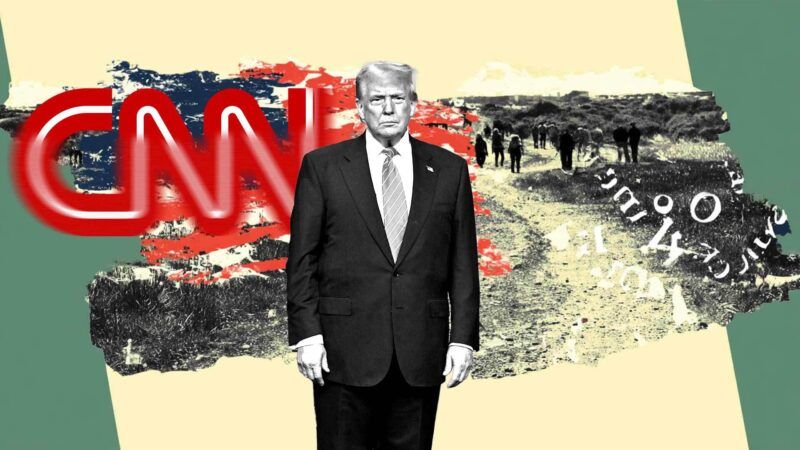The First Amendment Protects CNN's Reporting on ICEBlock and Iran
The Justice Department cannot constitutionally prosecute a news outlet for covering the news.

President Donald Trump has routinely taken umbrage with journalists exercising their freedom of expression to report on the news, which the First Amendment absolutely protects. CNN is the president's latest target.
At a Tuesday press conference, Homeland Security Secretary Kristi Noem said that her agency was "working with the Department of Justice" to see if the administration could prosecute CNN for its reporting on an app that alerts users about federal immigration enforcement activity in their area. Noem said CNN "is actively encouraging people to avoid law enforcement." Trump immediately followed Noem's comments by saying, "We'll maybe prosecute them also for having given false reports on the attack in Iran."
CNN published a story on Monday covering software developer Joshua Aaron's ICEBlock app, which lets "users alert people nearby to sightings of Immigration and Customs Enforcement agents in their area." CNN reports that the app, released in April, has amassed over 20,000 users. The app, which is only available on the App Store (Aaron is concerned about the mandatory data collection on Android devices), allows users to specify where they've spotted Immigration and Customs Enforcement (ICE) activity and alerts other users within a 5-mile radius via push notification. The function of the app is not dissimilar from Waze and Google Maps, which help drivers avoid encounters with police officers monitoring highways and roads for traffic violations.
The First Amendment protects ICEBlock, just as it does Waze and Google Maps. Even if it didn't, it still would protect CNN's coverage of it. Aaron Terr, director of public advocacy at the Foundation for Individual Rights and Expression (FIRE), tells Reason that prosecuting CNN for reporting on ICEBlock "would be like prosecuting a news outlet for reporting on Virginia drivers illegally using radar detectors to avoid speeding tickets." Moreover, the First Amendment protects the development and use of the ICEBlock app itself because "putting out general information that someone, somewhere might use to evade law enforcement" is not aiding and abetting but "just providing others true information," says Terr.
(CNN doesn't provide users the link to download ICEBlock from the App Store, which is also protected speech.)
Trump's threats against CNN for its coverage of early U.S. intelligence assessments regarding the strikes against Iran's nuclear sites are similarly unfounded. Trump's personal attorney, Alejandro Brito, alleged that CNN's and The New York Times' June 24 coverage of the strikes was false and defamatory, reports CNN. At the Tuesday press conference, Trump again insinuated that CNN defamed the pilots who carried out the operation. Establishing a defamation claim against CNN for its reporting on the efficacy of the American strikes against Iran would be hard, if not impossible.
To defame somebody, you must identify a person—the identities of the pilots are secret; publish information about them—CNN published information of public interest, but not about anybody in particular; the meaning of the publication must be defamatory—even if the pilots failed to completely destroy the sites, that would not be an indictment of their characters; the statement must be false—the extent of the damage to Iran's nuclear sites remains nonspecific; the statement must be an objectively verifiable statement of fact—it is unclear how anybody could prove CNN's statements as false, especially at the time of reporting (Defense Secretary Pete Hegseth said himself that "the impact of those bombs is buried under a mountain of rubble in Iran"); and the statement must be damaging and cause injury, which CNN's reporting did not. All of these elements must be met to establish defamation. CNN's Iran reporting does not satisfy a single one.
The First Amendment protects CNN's reporting in both of these cases, no matter how badly the administration wishes otherwise. If taken up by the Justice Department, "none of these prosecutions would have the slightest merit," says Terr.


Show Comments (26)